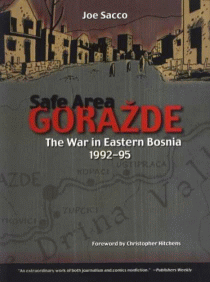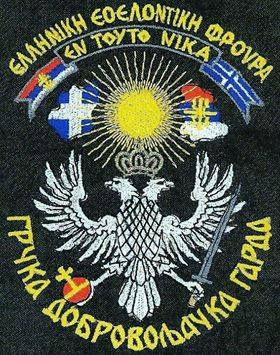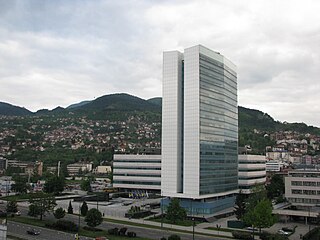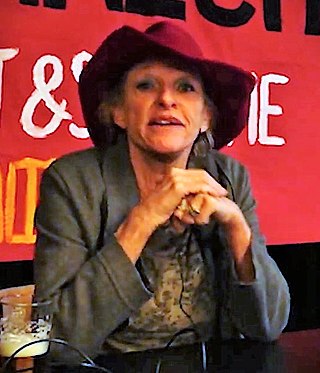Related Research Articles

Alija Izetbegović was a Bosnian politician, Islamic philosopher and author, who in 1992 became the first president of the Presidency of the newly independent Republic of Bosnia and Herzegovina. He later served as the first chairman of the Presidency of Bosnia and Herzegovina.

Naser Orić is a former Bosnian military officer who commanded Army of the Republic of Bosnia and Herzegovina (ARBiH) forces in the Srebrenica enclave in eastern Bosnia surrounded by Bosnian Serb forces, during the Bosnian War.
Edward Samuel Herman was an American economist, media scholar and social critic. Herman is known for his media criticism, in particular the propaganda model hypothesis he developed with Noam Chomsky, a frequent co-writer. He held an appointment as Professor Emeritus of finance at the Wharton School of Business of the University of Pennsylvania. He also taught at Annenberg School for Communication at the University of Pennsylvania.

The Bosnian War was an international armed conflict that took place in Bosnia and Herzegovina between 1992 and 1995. The war is commonly seen as having started on 6 April 1992, following a number of earlier violent incidents. The war ended on 14 December 1995 when the Dayton accords were signed. The main belligerents were the forces of the Republic of Bosnia and Herzegovina, the Republic of Herzeg-Bosnia, and the Republika Srpska, the latter two entities being proto-states led and supplied by Croatia and Serbia, respectively.

The Srebrenica massacre, also known as the Srebrenica genocide, was the July 1995 genocidal killing of more than 8,000 Bosniak Muslim men and boys in and around the town of Srebrenica, during the Bosnian War. The killings were perpetrated by units of the Bosnian Serb Army of Republika Srpska (VRS) under the command of Ratko Mladić. The Scorpions, a paramilitary unit from Serbia, who had been part of the Serbian Interior Ministry until 1991, also participated in the massacre.

The Bosnian genocide refers to either the Srebrenica massacre or the wider crimes against humanity and ethnic cleansing campaign throughout areas controlled by the Army of Republika Srpska (VRS) during the Bosnian War of 1992–1995. The events in Srebrenica in 1995 included the killing of more than 8000 Bosniak men and boys, as well as the mass expulsion of another 25000–30000 Bosniak civilians by VRS units under the command of General Ratko Mladić.

The Popular Association – Golden Dawn, usually shortened to Golden Dawn, is a far-right neo-Nazi ultranationalist criminal organization and former political party in Greece. Golden Dawn rose to prominence during Greece's financial crisis of 2009, becoming the third most popular party in the Greek parliament in the January 2015 election. Its support since plunged, and it failed to enter parliament in the 2019 election. The criminal trial against the leaders, frequently described as the largest trial of Nazis since the Nuremberg trials, lasted more than five years.

Safe Area Goražde is a journalistic comic book about the Bosnian War, written and drawn by Joe Sacco. It was published in 2000.
Diana Johnstone is an American political writer based in Paris, France. She focuses principally on European politics and Western foreign policy.

Greece and Serbia enjoy close diplomatic relations, which have traditionally been friendly due to cultural, religious and historical ties between the two nations.
Konstantinos A. Plevris, sometimes called in English Constantine Plevris or Kostas Plevris, is a Greek politician, lawyer, nationalist, and author. The prolific writer has, over the course of decades, written a number of books and other texts relating to Greek history, Greek culture, sociology, and politics, with a clear nationalist, homophobic content. In his book The Jews: The Whole Truth, he described himself as a "Nazi, fascist, racist, anti-democrat, anti-Semite". He was the founder and leader of the Metaxist 4th of August Party and Front Line, with the former political party not only playing a significant role in influencing and shaping the future direction of the Greek extreme right but also being itself as a prominent political movement before the Greek junta in general. He has also co-operated with various European neo-fascist groups, and figures such as Pino Rauti, Pino Romualdi, Giorgio Almirante. He later briefly joined the right-wing party Popular Orthodox Rally and was its leading candidate in the 2004 elections. He is the father of Thanos Plevris, member of the Greek parliament formerly with the Popular Orthodox Rally party, now with New Democracy.
During the Yugoslav Wars (1991–2001), propaganda was widely used in the media of the Federal Republic of Yugoslavia, of Croatia and of Bosnia.

The Scorpions was a Serbian paramilitary unit active during the Yugoslav Wars. The unit was involved in war crimes during the wars in Croatia, Bosnia and Herzegovina, and Kosovo. After the wars, four members of the unit were found guilty of killing six prisoners during the Srebrenica massacre of July 1995 and five were found guilty of killing fourteen civilians, mostly women and children, during the Podujevo massacre in March 1999.

The siege of Srebrenica was a three-year siege of the town of Srebrenica in eastern Bosnia and Herzegovina which lasted from April 1992 to July 1995 during the Bosnian War. Initially assaulted by the Yugoslav People's Army (JNA) and the Serbian Volunteer Guard (SDG), the town was encircled by the Army of Republika Srpska (VRS) in May 1992, starting a brutal siege which was to last for the majority of the Bosnian War. In June 1995, the commander of the Army of the Republic of Bosnia and Herzegovina (ARBiH) in the enclave, Naser Orić, left Srebrenica and fled to the town of Tuzla. He was subsequently replaced by his deputy, Major Ramiz Bećirović.

The Greek Volunteer Guard was a unit of Greek volunteers that fought in the Bosnian War on the side of the Army of the Republika Srpska. Some members of the unit are alleged to have been present in the area of the Srebrenica massacre and reportedly hoisted a Greek flag over the town, which was recorded 'for marketing purposes'.
The Kravica attack was an attack on the Bosnian Serb village of Kravica by the Army of the Republic of Bosnia and Herzegovina (ARBiH) from the Srebrenica enclave on Orthodox Christmas Day, 7 January 1993. The attack was organized to coincide with the Serbian Orthodox Christmas, leaving the Serbs unprepared for any attack. 43-46 people died in the attack on the Serb side: 30-35 soldiers and 11-13 civilians.
The Kravica massacre was one of the mass executions of Bosniaks by the Army of Republika Srpska during the Srebrenica massacre. It was committed on 14 July, 1995. It is estimated that between 1,000 and 1,500 men were killed.

Bosnian genocide denial is the act of denying the occurrence of the systematic Bosnian genocide against the Bosniak Muslim population of Bosnia and Herzegovina, or asserting it did not occur in the manner or to the extent that has been established by the International Criminal Tribunal for the former Yugoslavia (ICTY) and the International Court of Justice (ICJ) through proceedings and judgments, and described by comprehensive scholarship.

Greek reaction to the Yugoslav Wars refers to the geopolitical relations between Greece and the countries that emerged from the breakup of Yugoslavia as a result of the Yugoslav Wars as well as the international stance of the former during the years of the conflict in terms of activities by state and non-state actors . Despite any reactions, Greece allowed the NATO forces pass to the north.

Ingeborg Beugel is a Dutch freelance correspondent. Based in Greece, she had to temporarily leave the country in November 2021 after publicly questioning the Greek Prime Minister about pushbacks in Greece.
References
- ↑ Michas, Takis (4 July 2005), Greece's Balkan Closets, The Wall Street Journal Europe , retrieved 2009-08-09
- ↑ Michas, Takis (12 December 2008), Greece Is Burning, The Wall Street Journal Europe , retrieved 2009-08-09
- ↑ Michas, Takis (2002), Unholy Alliance, p. 176, ISBN 978-1-58544-183-9
- 1 2 "Athens court urged to dismiss libel action against journalist". Reporters Sans Frontieres. 17 September 2010. Retrieved 28 April 2015.
- ↑ Toljaga, Daniel (5 August 2009). "Greek journalist sued for writing about the presence of Greek paramilitaries in Bosnia". Congress of North American Bosniaks. Retrieved 28 April 2015.
- ↑ "Press Release Regarding a Lawsuit Against Greek Journalist Takis Michas". Congress of North American Bosniaks. 8 August 2009. Retrieved 28 April 2015.